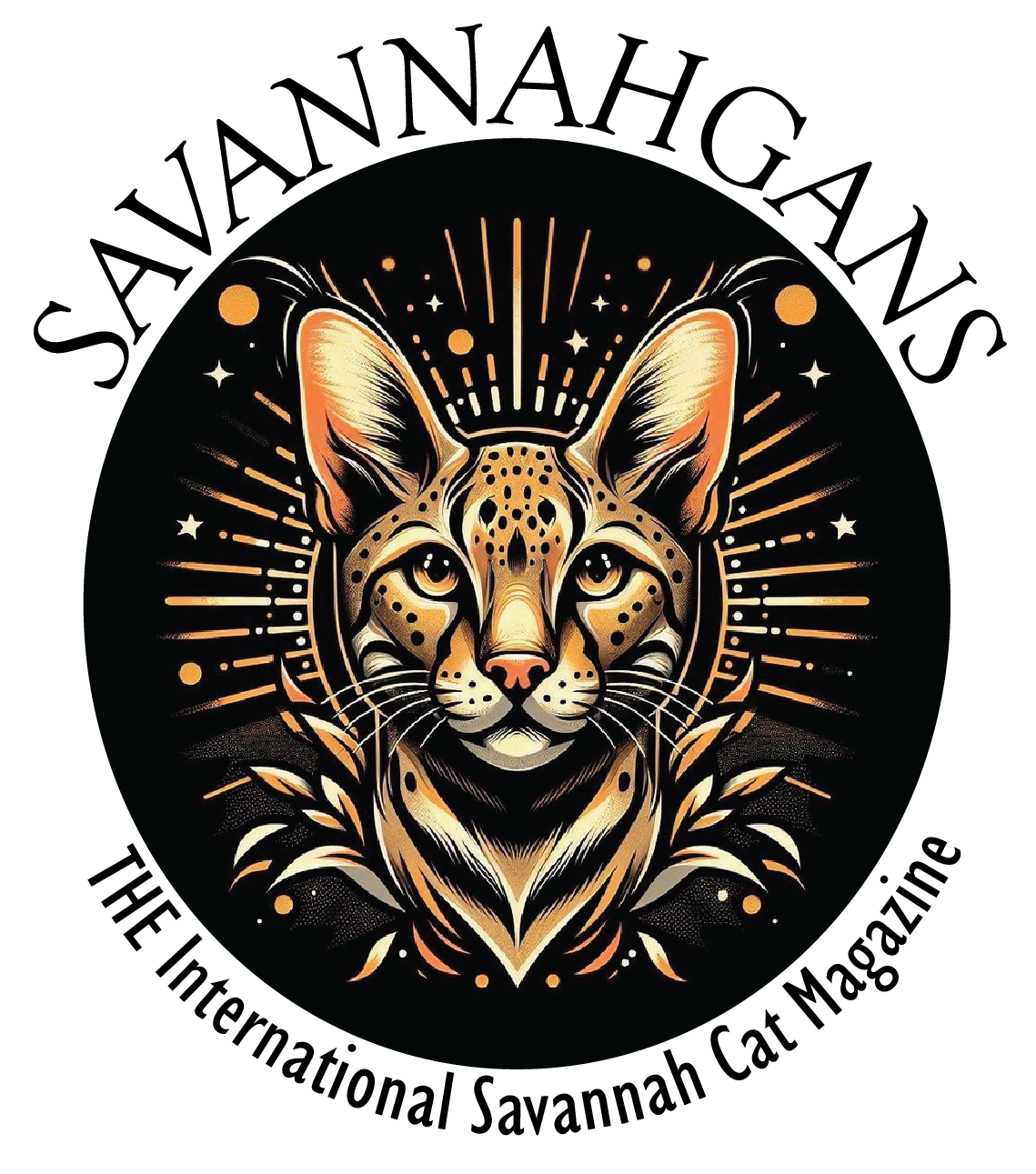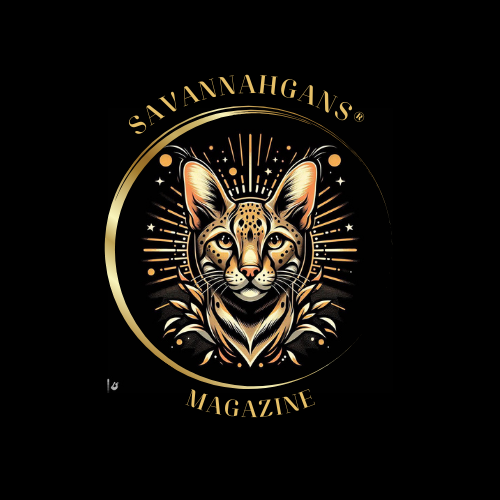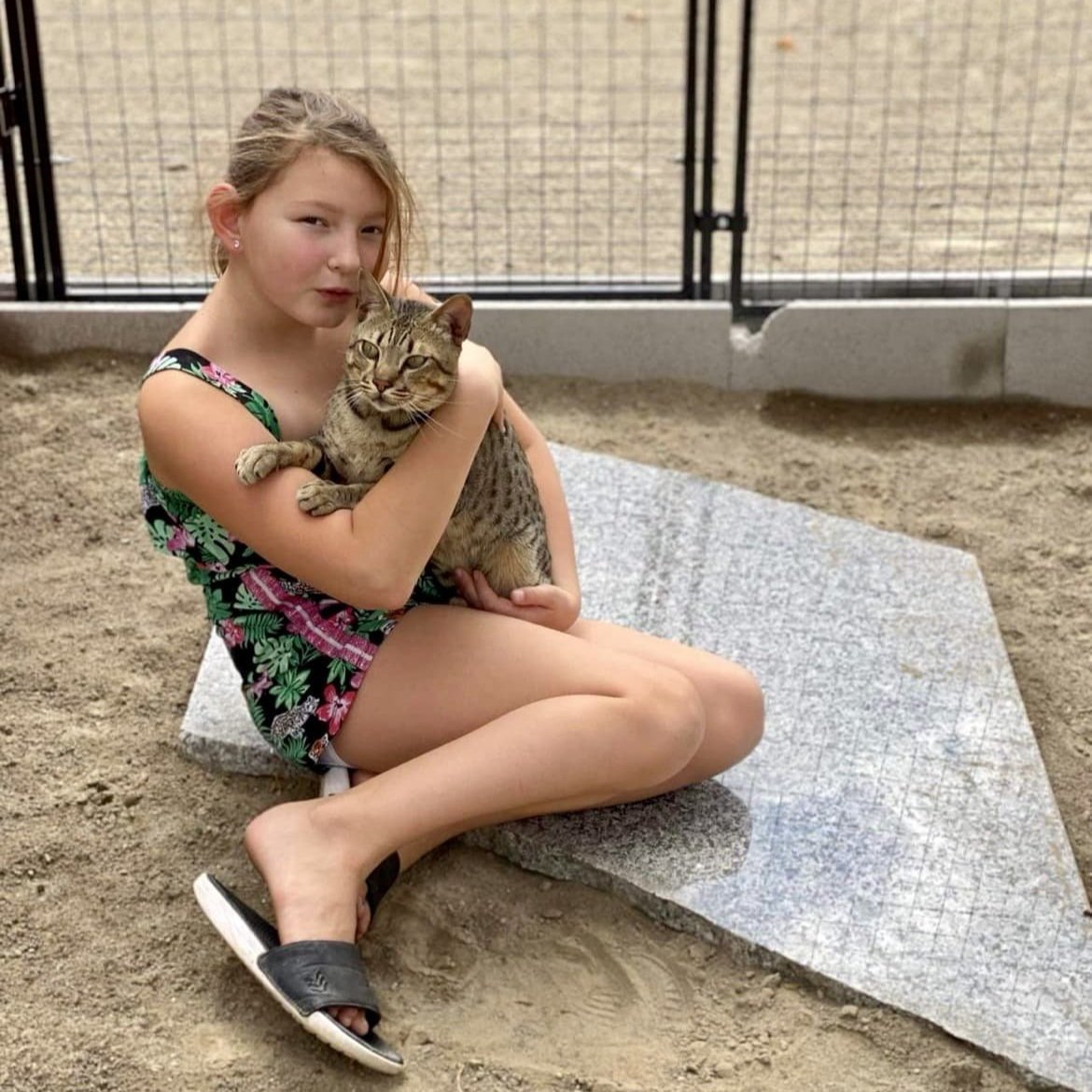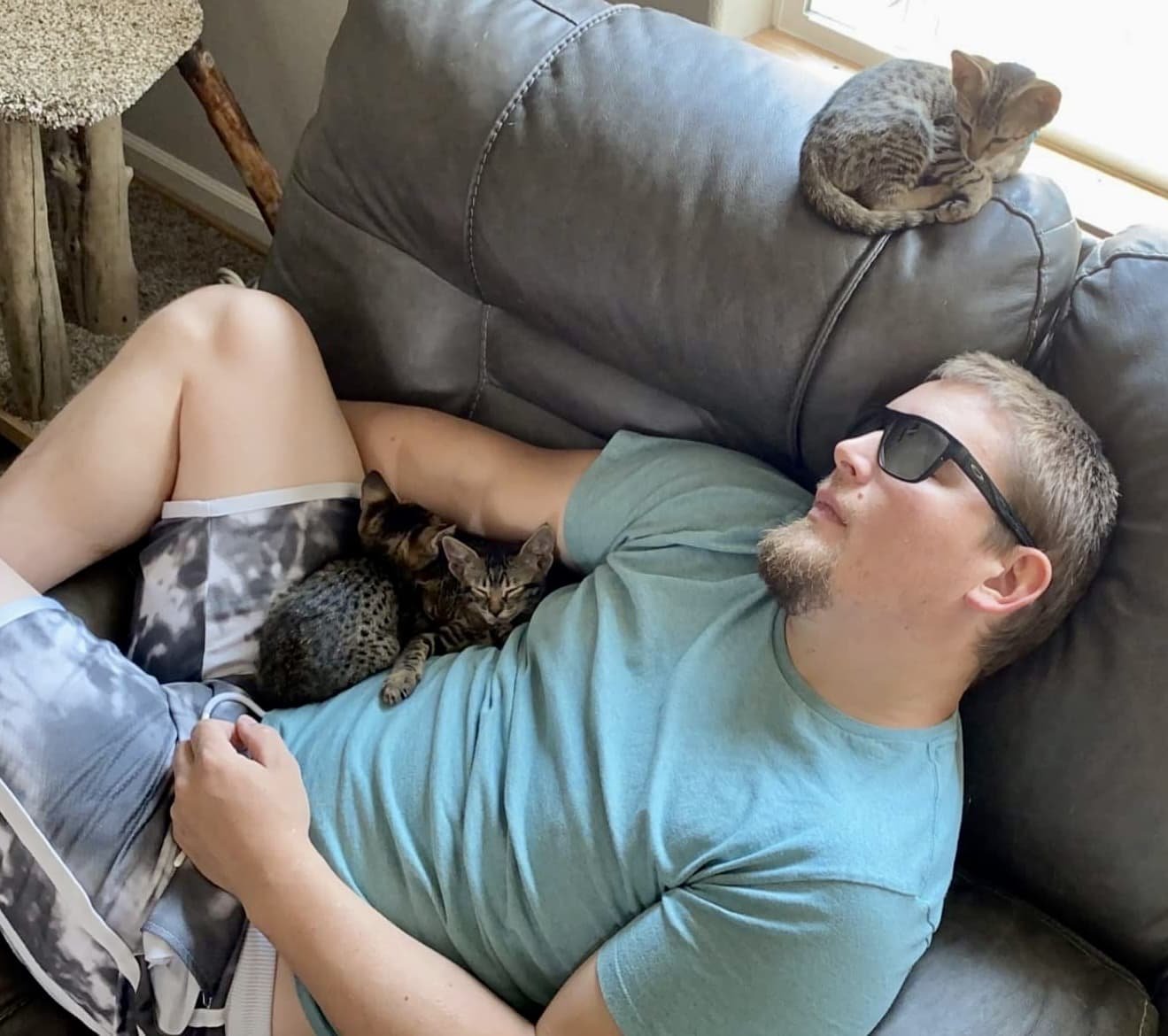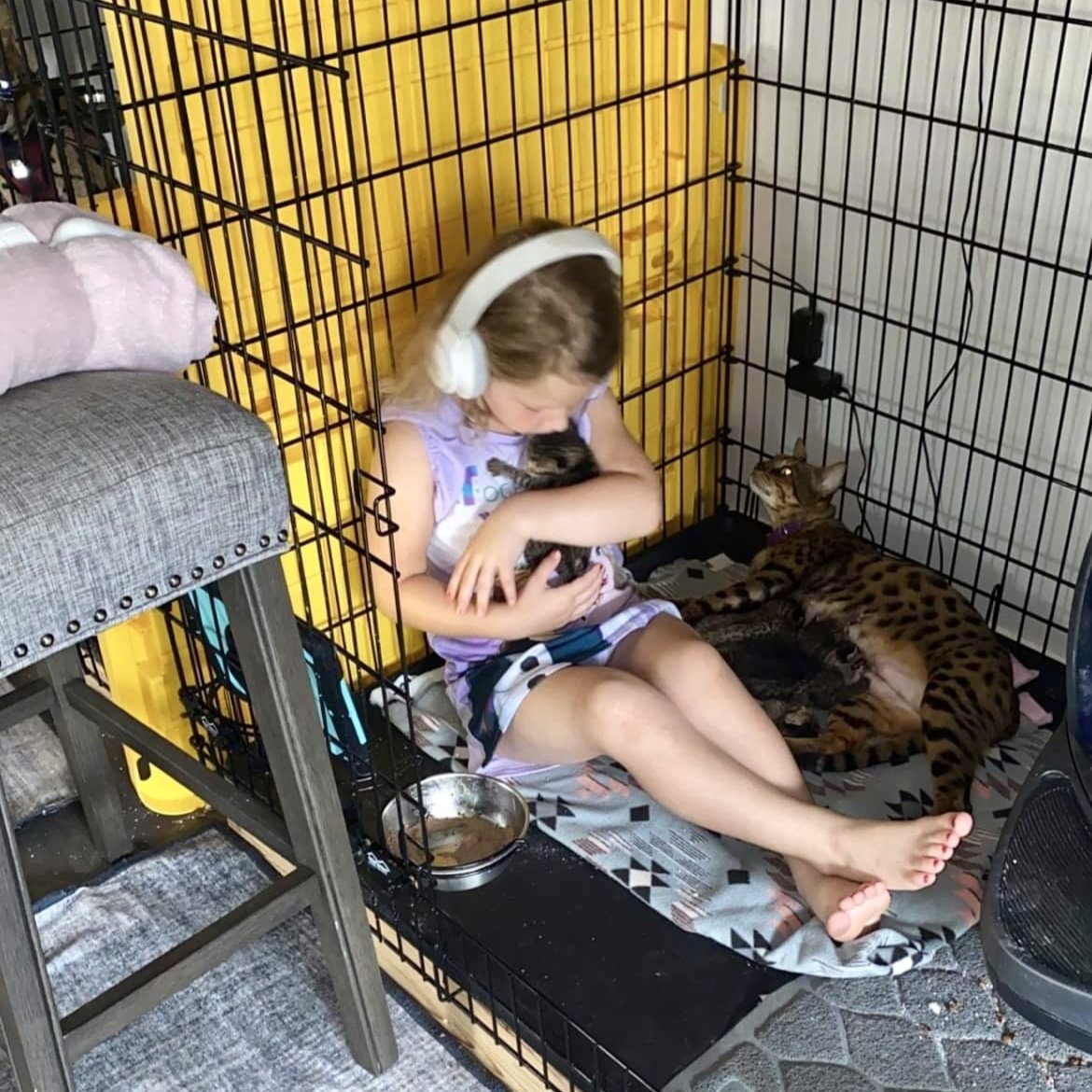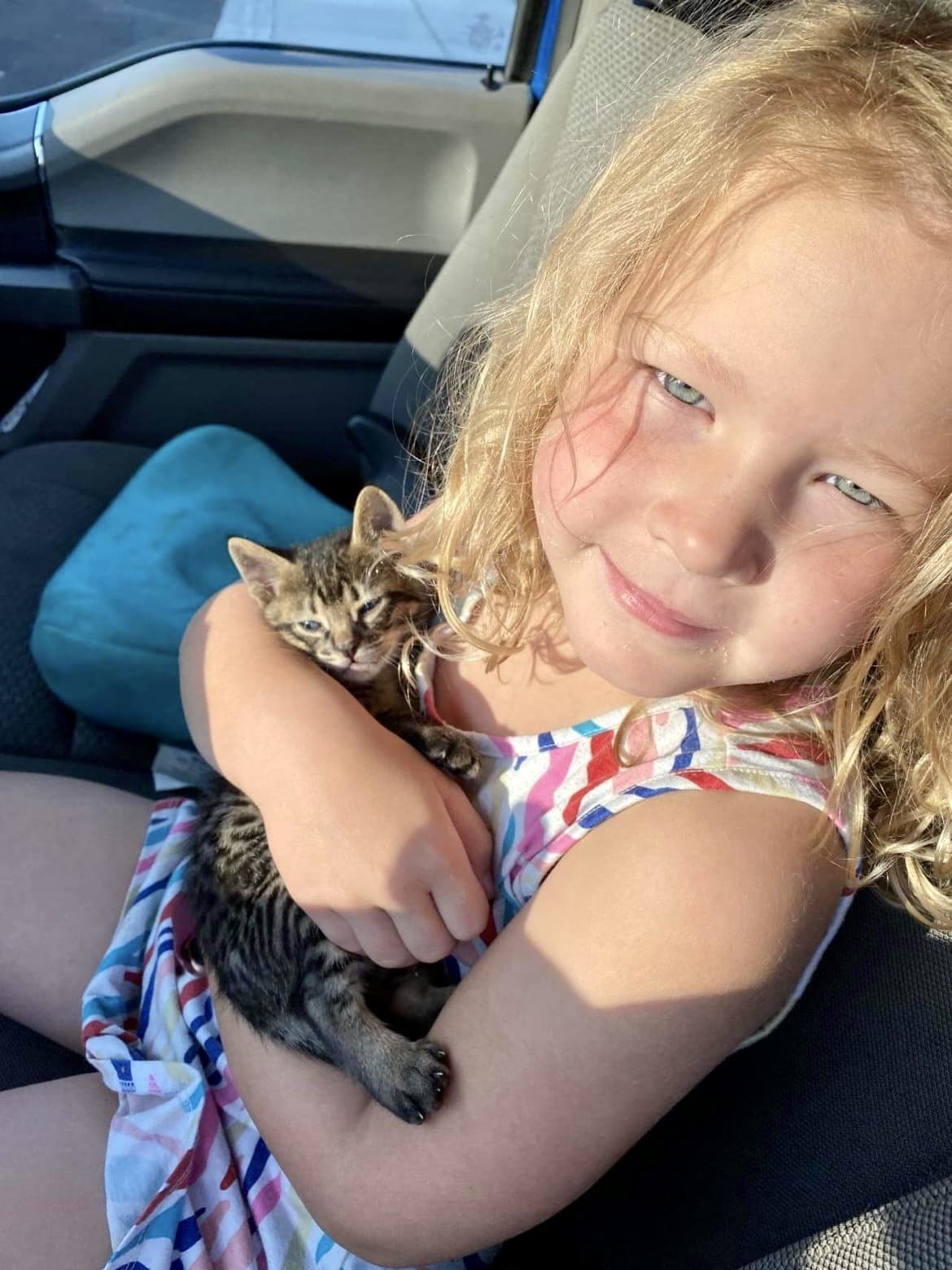SAVANNAHGANS® In-Depth Interview with Savannah Cat Breeder Makayla Johanson of Savannah Heightz
How did you come up with your cattery name of "Savannah Heightz"?
As a breeder, I want to improve Savannah's genetics and quality to higher standards than what our pet Savannahs were at the time. Besides acknowledging Savannahs as our specialized breed in our cattery, I wanted to incorporate another catchy word that still signified some of our purpose for breeding and a personal acknowledgment of our breed. This intention is where I got the "Heights" idea but with a spelling twist to "Savannah Heightz."
Where's your cattery located? I understand you have TWO Locations!
We are in two locations, yes! Our initial home is in the Pacific Northwest, Arlington, Washington, and our second home is in the Northeast area of Fernley, Nevada. We've just completed a custom home in Nevada, where we'll eventually transition permanently. In the meantime, we maintain both residences as we're firmly rooted in the PNW. All our breeding felines travel with us as we spend our year divided in each location.
Please tell us about yourself, your background, family, occupation(s), and how you got started with Savannah breeding.
I was born and raised in the Pacific Northwest but have always loved to travel and perused the idea of moving to a warm, dryer climate. I've been married to my wonderful husband for twelve years, and we share two young daughters, ages six and ten. I was an only child until I was ten years old. During the first ten years of my life, I grew up on a 283-acre farm in Darrington, WA. We raised horses, cattle, pigs, and chickens, and bred Australian shepherds for farming and German Rottweilers for protection. I have always had a love and passion for animals. I came from a family background in logging, farming, veterinary, and medical industry. With logging family members, we always had wildlife orphans coming home for rehabilitation to be released when recovered. My aunt was an exotic veterinary technician who led my love for exotic cats. I went with her to work with lions, tigers, and many other exotic animals. I went to college for Veterinary Assisting, where I first fell in love with the Savannah breed before having kids and finding my passion in pediatric health care rather than the heartbreak of veterinary care.
I purchased my first pet Savannah, in 2011. In 2015 I knew I wanted to breed savannahs and better the genetics and quality seen locally. Shortly after, I started breeding and didn't see the genetic pool I'd hoped. Hence, I began researching Serval ownership and breeding F1 Savannahs to introduce new genetics and lines within the Savannah breed. I work full-time from home, triaging patients as an NCMA, using my radiology and phlebotomy licenses while running my cattery. Working from home allows for 24/7 care of my cats and birthing mammas. We never expect any queen ever to give birth alone.
Is your family involved with your cattery work?
It’s all-hands-on-deck daily in our family, aside from my attributions. I can thank my children for their assistance in socializing and playing with each cat and kitten's daily and routine chores. The kids also provide nightly snuggles with those that like to snuggle. I have my husband to thank for engineering every idea or expectation I have for our ever-growing cattery. Our cats would not have all the luxury enclosures, toys, and enrichments if it weren't for his creations.
What's your typical daily routine at your cattery from morning to evening?
The daily routine within our cattery begins with cleaning and feeding each cat/kitten, followed by open playtime and socialization, which our children help tremendously. Feeding twice daily ensures that everyone constantly has fresh food and water. To maintain a clean and healthy environment, we use elevated food and water dishes, Litter Robots®, and large high-walled cat boxes for the cats who can't use the Litter Robots, aka our Serval. Running a cattery and caring for our animals is a 24/7 job. Taking any vacations means hiring help while gone.
What's the best part about breeding?
One of the best and most rewarding parts of having a cattery is seeing the improvements in each litter of healthy kittens, our research and purchase investments coming together, and the extraordinary changes each pairing brings to our cattery and the Savannah genetics pool. Not only watching the quality of each litter of kittens improve but building relationships with customers that become lifelong friendships.
What's the worst/most complicated part about breeding?
The worst part is everything that can go wrong in a cattery:
premature babies
viruses brought home from the grocery store or a routine vet visit
unforeseen need for C-sections
loss of a litter of kittens due to medical emergencies such as aspiration pneumonia occurring at birth
Breeding isn't all rainbows and butterflies. Many people don't realize the expenses breeders encounter to produce healthy, quality kittens. Those who breed for all the right reasons can quickly lose more money than they make.
Do you recommend people try breeding Savannahs? Why/Why not?
I believe you should only be breeding Savannahs with intentions of genetic testing, breeding line investigation, and research. Setting aside reserve funds for emergencies and having on-hand equipment in case emergencies happen to save and care for cats/kittens in an emergency or critical care needs. When people say, "I just want to have one litter" or "I want to make that kind of money," because they see Savannahs are expensive, you're not in it for the right reasons. They haven't researched how expensive it is to operate a safe, healthy, ethical cattery.
Did you or do you have a breeder mentor(s) you wish to acknowledge?
Honestly, I have the Savannah community to thank for much of the information I've learned and read about their experiences. I have several Savannah breeders to thank for the info and ideas. Many just, in general, passing messages and advice. East Tenessee Savannahs, GettaSavannah, Rainier Savannahs, Seattle Savannah for incredible cat apparel, Wyldthingz for an F7 SBT stud who created a fantastic foundation in my breeding program, and F2 Silver Queen. I'm sure I'm missing multiple other breeders. I've also spoken with or participated in discussions within the Savannahgans® Magazine talks.
What's the best breeding tip or advice you've received from another breeder?
The best advice I received from other breeders was to treat your studs like kings, as they're the foundation of your cattery. The health and well-being of your cats are a priority over quantity. Always follow the ethics of quality over quantity. Trust your gut when screening families—if something stands out to you as a red flag, there's a reason. It's not worth risking a kitten's life for money, period! Always have large areas of space for your Savannahs. Unhappy cats don't breed well, and multiple quarantine areas for new arrivals.
What's the biggest weakness of the Savannah breed?
One of the weaknesses is the lack of in-depth testing. Some breeders don't complete it routinely as well as many Savannahs look like Bengals with rosettes and don't follow the Savannah breed standards. There's a lack of genetic variation as the breed is still early in development, leading to many inconsistencies in how Savannahs look from breeder to breeder. Although both breeds are fantastic in their ways, they don't need crossing at this point.
What's the biggest strength of the Savannah breed?
The Savannah breed is a solid, tight community intending to produce genetically healthier cats than similar breeds and attempt not to repeat some things that go wrong genetically in other breeds.
What's the most important thing a breeder does?
One of the most important things a breeder needs to be aware of is to be clean and cautious. Be open-minded to learning. There's so much to learn, and no one knows it all. Never overcrowd your cattery. Socialize when kittens are born and expose them to as many safe things as possible to allow cats/kittens to acclimate into new homes. Always put your animal's health and well-being first.
What should new breeders know they may not have considered that you've learned from breeding?
Breeding is a full-time job. Spend a lot of time researching the different genetic tests out there. Be prepared for breeding emergencies, and be emotionally and mentally ready for the unexpected with kittens or a litter. Starting a breeding program is time-consuming and a costly investment with no guarantee. If you ever do, it will take many years to recover your startup expenses. Continue to purify our bloodlines with only Savannah-to-Savannah breeding and African Serval-to-Savannah breeding.
Do you feed your Savannahs a raw diet, and do you recommend raw feeding to your families?
I feed raw to our African Serval and those in our category which will also eat it. I don't recommend raw food to most pet owners as it can easily be misused and, when undereducated, could cause health problems in kittens. Our Savannahs eat kibble, and lactating moms get wet food while pregnant and nursing.
If not raw feeding or supplementing, what food brands/types do you recommend and why?
We cater diets to each cat's needs and preferences. I've chosen to use Northwest Naturals Raw Food with our cattery dynamics. We utilize vitamins, "Taste of The Wild" kibble, "Solid Gold Indigo Moon," "KMR" milk supplement," and "First Mate" wet foods.
Do you have a favorite Savannah Cat website or cattery?
Yes, I do have several websites and cattery pages I utilize. I enjoy the layout and info provided to customers on several cattery pages such as Bastet Exotics, Getta Savannah, and Wyldthingz. I reference customers via my website to many sites such as Savannah Cat Association, Savannahgans® Magazine, UC Davis Genetic Lab Testing Sites, and Hybrid Law.
Do you or have you bred any other type of cat or animal besides Savannahs?
I haven't bred any breed of a cat other than Savannahs, but I grew up around several species of exotic animals, bobcats, and large feline species. I've bred equine and canine breeds.
What do you think about phasing out F1, F2, and F3 Savannahs?
It's honestly devastating. The Savannah breed is excellent, with tremendous growth. It's currently a healthy breed, and they make great pets. Removing F1-F3 generations will significantly reduce the gene pool and cause inbreeding, bringing unhealthy genetic issues. Doing this does not further help the development and growth of the breed.
I understand you own a Serval! What can you tell us about owning and breeding with Servals?
Yes, I do own a serval! Since he was five weeks old, we have been hand-raising our Serval from a local breeder in Redmond, OR. Tahfari requires an immense amount of time and socialization continuously. He needs a much different environment, enclosure space, enrichments, and diet than the Savannah breed. He still sleeps with us and plays with our children and our dog. He loves going on car rides and meeting new people in our home. He is delightful and a total gentleman with all our Queens. We raised him with the litter of one of our F4 kittens when we brought him to our home to our cattery. And yes, that was intentional planning on our part. Tahfari has the utmost respect for our F3 Queen Keeta as she raised him and put him in his place, teaching him how to be a respectful gentleman towards everyone. We can even have him with our F7 stud under supervision, and everyone coexists with a healthy relationship.
Tahfari will always be an African serval, though, not a Savannah. He'll tell you when he's done and has reached his limits. We see this in his everyday behaviors. We can cuddle with him, go on walks, and car rides, sleep, take baths and showers, and play with him. With extensive socialization and desensitization training as a kitten, he's created a trusting bond with everyone in our family. He's even great when we go for veterinary checkups. He loves to meet new potential families who pick up their new kittens; or those interested in becoming a breeder. We watch him extremely close as he has an infatuation with anything silicone, fleece, and destructible dog toys.
What are some special/unique traits and characteristics specific to the cats you've bred?
One of the most appreciated characteristics/ traits we hear from our families is how loving, loyal, adaptable, and social our kittens are. We often hear that we must have sold them a dog in a cat's body. How exotic and Serval-like our Savannah kittens/cats' traits are. I explained to pet owners that SBT Savannahs are more of your cuddly domestic cat versus the F1 through F3, tend to be like a medium to large dog, and are not always guaranteed to be a fan of being cuddled, picked up, held, and packed around. Although many times there are exceptions to that. Early generation savannahs. Such as, the F1 will be very devoted, like a dog, to one person. However, the later the generation from the F1, the more likely to bond with multiple family members. I also told buyers that savannahs vary in size, and there is no guarantee. One generation can be larger than the other and vice versa. But no matter the size, savannahs do great with smaller cats and non-aggressive dogs. They are high-energy and curious cats. They will never be couch potatoes; as I explain to them, Savannahs never outgrow the kitten stage.
What should a potential buyer of a higher generation Savannah know upfront about owning one?
Potential buyers should know that higher-generation Savannahs require more space, one-on-one time, and continuous socialization. They require more items in the house to keep them mentally challenged. Or they become bored and can be destructive. They need to understand that they are very loyal to their person but do not always enjoy the company of strangers. Savannahs, in general, are large commitments, but early-generation Savannahs are even more of a commitment as they don't easily rehome.
What's your position/opinion on the term HPF1?
HP F1 is a very controversial title. I believe the term HP should only explain an African serval to an F1 Savannah pairing. I don't think breeders should attempt to put a specific genetic percentage of African Serval next to the HP F1 kitten, as there's no legitimate test to test this amount. I explain this to buyers in the sense of if they have siblings who share the same parents. Each sibling carries different genetic factors and isn't the same as another because they have the same parents. Each sibling takes other genetic pieces from each parent and ancestry. You get very exotic serval-like kittens when you pair the F1 Savannah with an African Serval. But with that, you can also get more of the serval traits which don't always make the best pets due to uncertain personalities as they mature. That can negatively impact the longevity of the Savannah's life within its new home. Inconsistent litter box habits can lead to rehoming and lack of bonding once they hit maturity of about two years old. F2 and later-generation mothers make better-tempered and predictable pets and have better chances of bad litter box habits.
What else would you like the Savannah world to know about you and your cattery?
Savannah Heightz Cattery is a small in-home cattery based out of Washington & Northern Nevada, specializing in producing unique purebred F1A, F2B, F3C, and SBT Savannah (F4-F8) kittens with a wild majestic look of their Serval ancestor. We breed our cats to develop further the Savannah breed standard and genetic pool with a direct emphasis on large ears, long legs, and a majestically bold black spotted pattern. Our cats are not inbred or "line bred," Doing so wouldn't further develop the Savannah breed. We raise all our cats inside our home as a family with our daughters and various pets. Savannah Heightz cats have the luxury of a sizeable indoor-outdoor enclosure to freely move as they indulge in many toy enrichments to amuse their natural curiosity and wild side. Follow our Savannahs at www.savannahheightz.com or on social media https://www.facebook.com/Savannahheightz and https://www.instagram.com/savannahheightz.
Our kittens come with
· TICA registered
· Copy of Contract
· Health Guarantee
· Microchipped
· Age-Appropriate Core Vaccinations
· Prophylactically Dewormed
· Prophylactically Flea Treated
· Veterinary Clearance (copy of exam Provided)
· Blanket OR Toy
· Sample Transitional Food (Depending on flight regulations)
· FIV/Felv Negative Parent Results
· Fecal Testing
· Respiratory Panel Testing
· Par's genetic testing: PRA & PKDEF results in N/N
· Litter box trained
· Lifetime of advice & guidance
Read my article Owning a Serval as a Pet or Breeder Here.
Help SAVANNAHGANS® Grow and Reach Every Savannah Cat-Owning Household! All support is humbly appreciated (visit the clickable underlined links).
Subscribe (free) HERE
Share this article on your social media platforms.
Leave a Comment. (this is VERY helpful to our growth and Google recognition)
Follow on Instagram.
Follow on Pinterest
